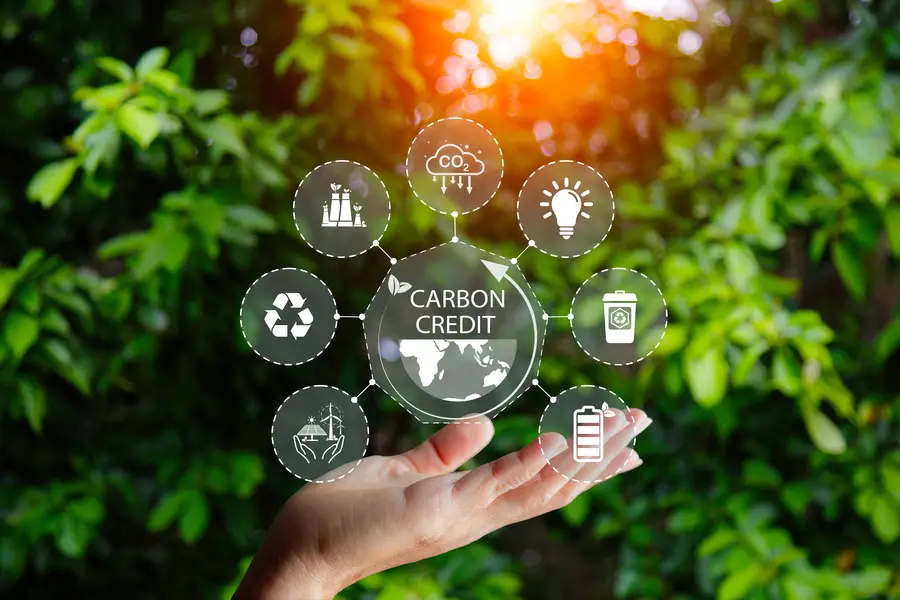
The world’s newest carbon market offers exciting opportunities for fueling economic growth while reducing greenhouse gases. Though voluntary carbon markets across Africa are still nascent, their expansion offers an intriguing new pathway to bring much-needed finance to African communities and entrepreneurs. Doing so could create value in protecting the continent’s natural resources while powering its low-carbon growth and development.
The scaling of Africa’s carbon markets couldn’t come at a more critical time – the world is on the brink of an irreversible global temperature increase. Bringing down global emissions needs to happen at unprecedented levels and speeds to avert this catastrophe. Africa has untapped potential for carbon projects that can help the world address this crisis.
To deliver on the dual objectives of climate change mitigation as well as resilient development, Africa’s carbon markets need to be developed both quickly and carefully with these outcomes in mind. We are optimistic this is possible. In this blog, we explore this exciting new pathway for sustainable development and what needs to happen to maximize its potential.
The benefits of developing Africa’s carbon market
From planting trees and protecting biodiversity to generating off-grid clean energy through technologies like solar, Africa has multiple avenues for creating quality carbon credit projects. Voluntary carbon markets provide opportunities for businesses and countries to purchase credits like these that support clean energy transitions and carbon-neutral growth.
Growing interest in voluntary carbon markets, especially among companies and countries in the global North, has created three key opportunities for Africa:
- Increase private sector engagement and investment in Africa: In purchasing carbon credits from Africa’s carbon markets, companies are channeling investment not only toward climate change mitigation, but also toward adaptation and resilience in the communities where carbon projects are located. This accelerates the flow of private capital to Africa and can de-risk future private investment in clean energy and other areas critical to economic growth.
- Channel climate finance to where it is needed most: The development of Africa’s carbon markets can catalyze funding from wealthier countries and regions, moving money to where it is most needed. This new financing stream can help the communities and countries least responsible for emissions, and yet hurt the most by climate change, adapt and remain resilient in the face of climate shocks.
- Fund net-zero development across the continent: Greater public and private investment unlocked by the carbon market and new carbon projects in Africa provides funding that can improve economic growth and lives in African countries while furthering just transitions to clean energy and net-zero development. Carbon credits can also generate export revenue for African governments to invest in furthering sustainable development.
Renewable energy is a great example of these benefits in action. Over 600 million people in Africa do not have access to electricity. At the same time, the continent is only generating about 2 percent of its maximum potential for renewable energy. Carbon market development could significantly transform this situation by derisking and catalyzing financing for renewable energy projects that expand clean and affordable energy access to unserved communities. Global investors remain hesitant to invest in renewable energy projects in Africa at the scale needed to address these issues because they view these projects as highly risky. By adding a revenue stream from the sale of carbon credits, renewable energy projects in Africa can lower this perceived risk and attract more global investment.
Building a strong foundation for carbon market growth
These types of benefits will not happen on their own. Africa’s carbon markets need to ensure integrity and avoid unintended consequences as they grow while reducing costs. To fully unlock the promise of carbon markets for climate mitigation, adaptation and resilience, African countries can learn from other carbon markets, leverage proven approaches and modern technologies, and invest in the enabling environment.
One key lesson learned is the need to stay focused on the outcomes of carbon markets – not just the process – to avoid exploitation of loopholes. Transparency and a shared code of conduct among governments, suppliers, and buyers of carbon credits can help ensure that projects achieve their intention of reducing or avoiding emissions and powering net-zero development, instead of creating opportunities for greenwashing. To further avoid unintended consequences, project developers must engage local communities throughout carbon project development and implementation to ensure they enjoy an equal share of the benefits.
Prioritizing integrity from the start can also help Africa maximize the funding it gets from its carbon markets as high integrity projects garner a higher value. Additionality – that carbon projects create new sequestration, avoidance, or reduction of emissions than what would have otherwise occurred under a “business as usual” scenario – is a core component of integrity as is clear tracking of carbon credit ownership and avoidance of double counting.
This is where modern technology can reduce costs and boost confidence. Digital technologies and data like remote monitoring and imaging can help verify and track carbon projects in real time, reducing the opportunities for greenwashing and exploitation. Automated carbon registry platforms can help smooth market function across suppliers, intermediaries, and buyers, reducing the long lead times for carbon project development in Africa and increasing transparency.
A more clear and complete enabling environment for each country’s carbon market would also reduce investment costs and de-risk project creation. For example, regulations are needed for carbon credit reporting, registration, and commercialization along with emissions reporting.
Global partners can support carbon market growth
Development practitioners can also contribute to the exciting development of Africa’s carbon markets and the promise they hold for resilience by helping to build local capacity for quality carbon credit projects, ensuring local communities are consulted and engaged in project design and implementation, supporting trainings and skills development to help people capitalize on new green job opportunities, and working with governments to improve the regulatory environment. The Africa Carbon Markets Initiative (ACMI)– and their roadmap for developing Africa’s carbon markets – is a great example of partners collaboratively supporting development of Africa’s carbon markets in a way that fosters co-benefits.
We are optimistic about the outlook for Africa’s carbon markets and what it can mean for long-term, net-zero development across the continent. Today, only a handful of African countries have tapped into the benefits of the carbon market, with opportunity for many more to do so and for benefits to be more equitably distributed. With the right work put in now to avoid unintended consequences, ensure integrity, reduce costs, and leverage modern tools, Africa’s carbon markets can accelerate sustainable development for a brighter future for all.
Learn more about RTI’s Center for Climate Solutions and our work on energy for development


